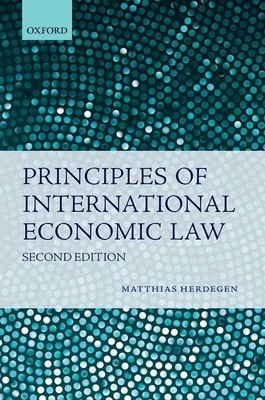
- We will send in 10–14 business days.
- Author: Matthias Herdegen
- Publisher: Oxford University Press, USA
- ISBN-10: 0198790570
- ISBN-13: 9780198790570
- Format: 16.3 x 23.6 x 2.3 cm, minkšti viršeliai
- Language: English
- SAVE -10% with code: EXTRA
Reviews
Description
Principles of International Economic Law provides a comprehensive overview of the central topics in international economic law, with an emphasis on the interplay between the different economic and political interests on both the international and domestic levels. Following recent tendencies, the book sets the classic topics of international economic law, like WTO law, investment protection, commercial law and monetary law in context with aspects of human rights, environmental protection and the legitimate claims of developing countries. The book draws a concise picture of the architecture of international economic law with all its complexities, without getting lost in fragmented details. Providing a perfect introductory text to the field of international economic law, the book thoroughly analyses legal developments within their wider political, economic, or social context. Topics covered range from codes of conduct for multinational enterprises, to the human rights implications of the exploitation of natural resources. The book demonstrates the economic foundations and economic implications of legal frameworks. It puts into profile the often complex relationship between, on the one hand, international standards on liberalization and economic rationality and, on the other, state sovereignty and national preferences. It describes the new forms of economic cooperation which have developed in recent decades, such as the growing number of transnational companies in the private sector, and forms of cooperation between states such as the G8 or G20. This fully updated second edition covers new aspects and developments including the growing importance of corporate social responsibility, mega-regional-agreements like CETA, TTIP, and TPP, trade and investment related aspects of human rights law.EXTRA 10 % discount with code: EXTRA
The promotion ends in 21d.13:23:21
The discount code is valid when purchasing from 10 €. Discounts do not stack.
- Author: Matthias Herdegen
- Publisher: Oxford University Press, USA
- ISBN-10: 0198790570
- ISBN-13: 9780198790570
- Format: 16.3 x 23.6 x 2.3 cm, minkšti viršeliai
- Language: English English


Reviews